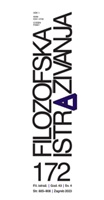Sociologijska teorija Margaret Archer1 Epistemološki temelji, konceptualne kategorije, kritičke objekcije i aplikativne perspektive
Sociological Theory of Margaret Archer Epistemological Foundations, Conceptual Categories, Critical Remarks, and Research Perspectives
Author(s): Miroslav Mihetec, Krešimir ŽažarSubject(s): Epistemology, Social Philosophy, Contemporary Philosophy, Social Theory
Published by: Hrvatsko Filozofsko Društvo
Keywords: Margaret Archer; critical realism; analytical dualism; morphogenetic/morphostatic approach; relational sociology; heuristic potential;
Summary/Abstract: The axial aim of the paper is to dissect the main concepts of Margaret Archer’s theoretical position. In that line, first, the broader context of critical realism as a unique standpoint of philosophy of science is depicted, as her understanding of epistemology of the social is derived from there. The main body of the manuscript conveys discussions about crucial conceptual categories of the sociology of Margaret Archer primarily linked with analytical dualism, realist social theory, and morphogenetic/morphostatic approach. Moreover, a short review of novel tendencies in further articulation of Archer’s theory, such as relational sociology, is presented. Furthermore, some examples of empirical application of her concepts are noted, as well as some critical remarks addressed to her epistemological-theoretical standpoint. Finally, in the concluding section, the prospects of using Archer’s sociological theory for empirical research on the transformation of contemporary Croatian society are emphasized.
Journal: Filozofska istraživanja
- Issue Year: 43/2023
- Issue No: 04/171
- Page Range: 793-816
- Page Count: 24
- Language: Croatian

